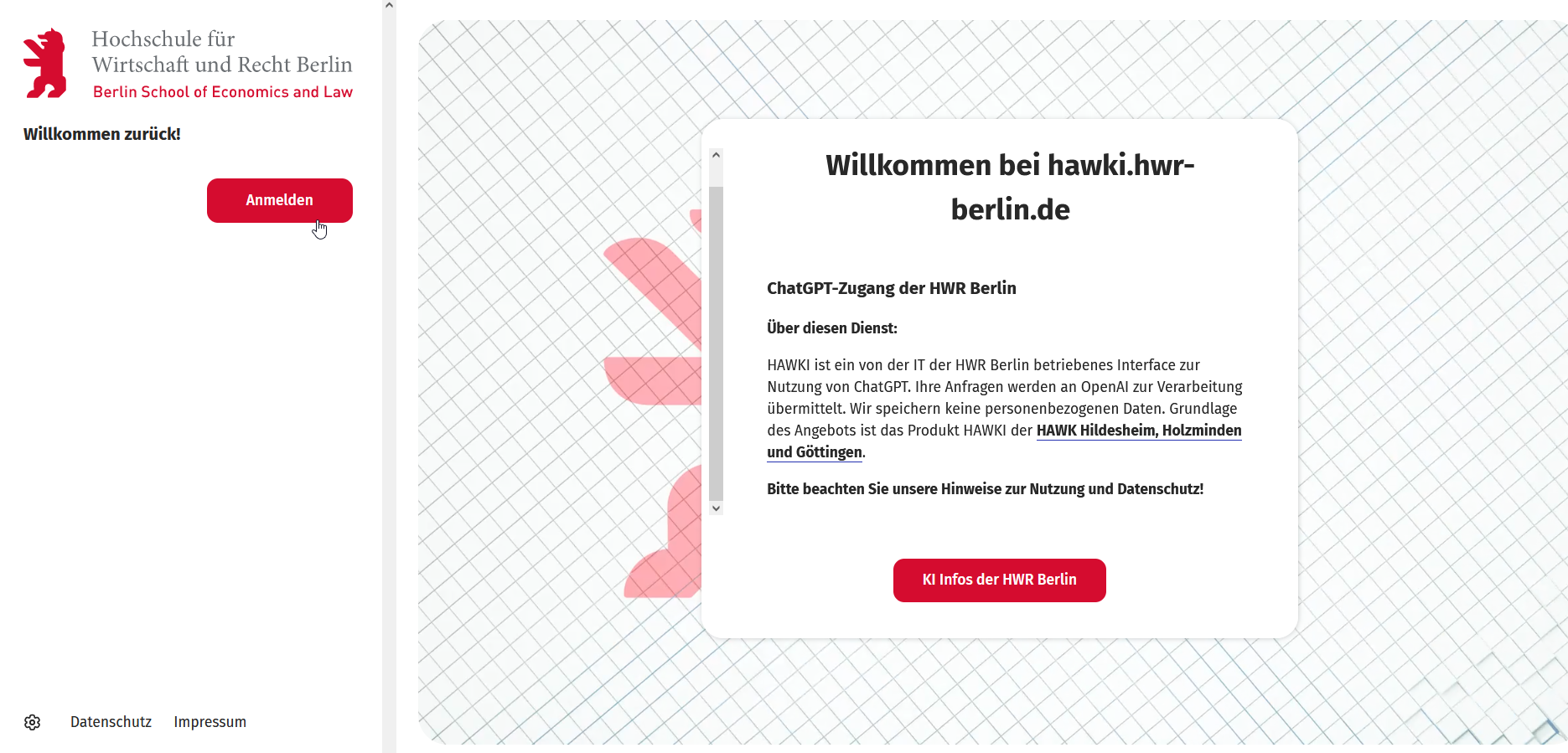Generative AI in Studies and Teaching
Generative AI tools, such as ChatGPT, shape our everyday lives and higher education teaching. HWR Berlin actively and critically engages with generative AI and its significance for shaping studies and teaching.
We discuss its impact on teaching and learning processes, as well as on examination and assessment methods. Furthermore, HWR Berlin aims to continuously create and develop opportunities for both students and teaching staff to promote competent, reflective, and ethical use of AI tools.
In the following, we have summarised information, offerings, and regulations of HWR Berlin. On the subpages, students, and teaching staff can find targeted answers to relevant questions regarding generative AI.
Since the winter semester 2024/25: HWR Berlin offers students and teaching staff data protection-compliant and free access to the text generator ChatGPT through the HAWKI service via their HWR user account.
First orientation
What is text-generative artificial intelligence?
Text-generative artificial intelligence (AI) is a type of advanced software capable of writing human-like text. It uses complex algorithms and vast amounts of data to understand and generate language. The AI is initially “trained” with a large amount of text—this can include books, articles, websites, and more. Through this, it learns how language works and which words are often used together. Once the AI is trained, it can generate its own text based on this knowledge.
Information and Learning Resources
Various information and learning resources are collected on this page and its subpages. In the winter semester 2024/25, HWR Berlin will offer its own events on AI for different target groups. Additionally, we are involved in nationwide initiatives and recommend resources from external institutions such as the “KI Campus”. This information will be continuously updated.
Contact Persons
AI is not just a technology; it also changes work processes and impacts teaching and studies. Therefore, there are contact persons available in central service areas as well as in the different departments for this topic.
Glossary
Information for Students
Information for Teaching Staff
HAWKI
HWR Berlin is now offering access to text-generative AI through the new service “HAWKI“, providing access to OpenAI GPT-4o and, in the near future, to open-source language models. With this, HWR Berlin aims to enable a constructive and critical engagement with generative AI by involving all university members. This access is data protection compliant and available via the university’s central user account
Start HAWKI
HAWKI FAQ
What is HAWKI?
HAWKI is a service provided by HWR Berlin that offers secure and efficient access to the generative AI tool from OpenAI. A chat area similar to ChatGPT is available. This service is available to teaching staff and students of HWR Berlin during an initial one-year pilot phase. Access is provided via the university’s user account. Only the inputs, known as prompts, are sent to OpenAI. .
How can I use HAWKI?
You can use HAWKI through the URL https://hawki.hwr-berlin.de/. Personal registration with ChatGPT is not required. Your user data is not forwarded to OpenAI.
Is personal data transmitted to OpenAI?
No. OpenAI only receives the prompts you enter. Neither user data nor IP addresses are shared, as the HAWKI server handles the mediation. Usage is anonymous, which means chat histories cannot be stored on a user account.
Is data secured, monitored, or analysed?
No. There is no storage, monitoring, or analysis of data. The inputs are not used for training the AI at OpenAI, which is ensured by specific settings in the API. However, for technical analysis of misuse and improper use, OpenAI will retain your anonymous requests on its servers for up to 30 days.
Are there any costs associated with using it?
Currently, HWR Berlin centrally covers the costs for using HAWKI. The costs are based on the number of words in the inputs and responses. OpenAI charges per 1,000 tokens (tokens are parts of words; approximately 750 words per 1,000 tokens), with the costs ranging between 1 cent and 12 cents per 1,000 tokens. Therefore, short and concise queries help save costs!
What can I use HAWKI for?
Always be careful not to include any personal or sensitive data in your queries.
An initial overview of usage is provided in the following video from the Design Lab: Generative Text-AI – Introduction to HAWKI by HAWK Digital Environments on Vimeo.
Are there rules for usage?
Yes, the most important rules are:
- Do not use personal data in the inputs.
- Do not use copyrighted works in the inputs.
- The use of HAWKI is only permitted within the context of education for studies and the teaching staff or official duties.
The terms of use must be observed.
Are there any recommendations for handling the results?
Why is HAWKI offered only in a pilot phase?
HWR Berlin is gathering experience regarding the use and the resulting costs. The continuation of the service depends on the development of costs, as well as legal and market-related factors. Changes in the service structure are possible as needed. For questions, please contact: elearning@hwr-berlin.de.
Will there be additional language models?
Events at HWR Berlin
Prompt engineering made easy(er)
in preparation for WiSe 25/26


